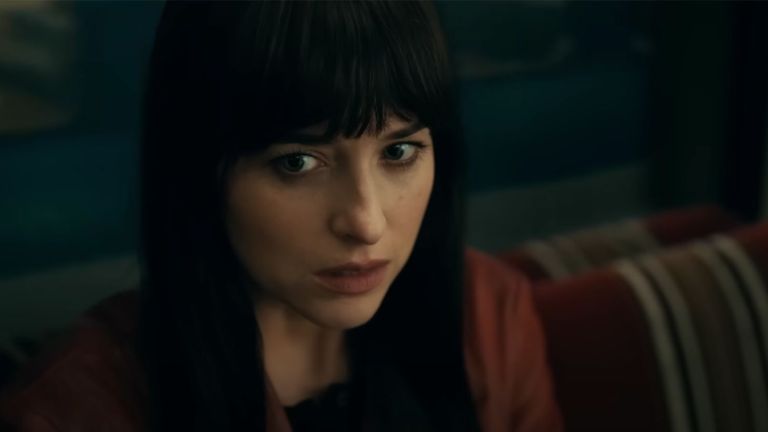This Madame Web Line Shows the Movie Doesn’t Understand Spider-Man at All
Madame Web tries to connect to Spider-Man's origin, but completely misses the point of the character and his ethos.

This Madame Web article contains spoilers.
“With great power comes great responsibility” might be the most important line in superhero fiction. It crystalizes a theme present in the best superhero stories even before Spider-Man‘s debut in 1962’s Amazing Fantasy #15, Jerry Siegel and Joe Shuster’s Superman tales and Bill Parker, and C.C. Beck’s Captain Marvel adventures. The line transforms superhero stories from mere power fantasies to stories about service and care, about empowering others instead of consolidating power for yourself.
So when a member of Las Arañas, Madame Web‘s ill-advised magical natives, tells Cass Webb (Dakota Johnson), “When you take on the responsibility, great power will come,” it’s clear the production team has lost the plot.
Director S.J. Clarkson, who co-wrote the script with Matt Sazama, Burk Sharpless, Claire Parker, and certainly a boardroom of IP lawyers, intends the line to break Cass out of her solitary existence to care for others. That makes sense, as Cass begins the movie telling Ben Parker (Adam Scott), the audience, and everyone else how she doesn’t do families, only to end up protecting teens Julia Cornwall (Sydney Sweeney), Anya Corazon (Isabela Merced), and Mattie Franklin (Celeste O’Connor) from Ezekiel Sims (Tahar Rahim).
But it places the motivation in the wrong direction. Like most of the original Marvel heroes that Jack Kirby and Steve Ditko created with Stan Lee, Spider-Man has power thrust upon him. He doesn’t seek it and throughout the comics that Ditko, John Romita, Gerry Conway, and Lee wrote in the ’60s and ’70s, power makes Peter’s life demonstrably worse. And yet time and again, responsibility drives Peter to accept that power as it helps him inspire and help others.
Even the recent Ultimate Spider-Man #1 (written by Jonathan Hickman, drawn by Marco Checchetto, colored by Matthew Wilson, and lettered by Cory Petit), in which an adult Peter Parker chooses to accept his Spider-Man powers, does so through the support and encouragement of others.
In Madame Web‘s retelling, responsibility is a means to power. Up until the Araña member delivers the line, Cass had straddled the line between a tragic origin and a straightforward power fantasy. Like many Marvel heroes, her powers manifested during a near-death experience, which gave her the ability to glimpse the future and alternative realities. The powers disrupt her life, albeit in small forms, such as botching a party game at Mary Parker’s (Emma Roberts) baby shower or forcing her to spend time with three teenage girls.
But like the comics that first introduced Ezekiel Sims, Madame Web leans heavily into mystical chosen one narratives, framing Cass’s powers less as the result of an accident and more of a higher power’s ordering. When Las Arañas allow Cass’s pregnant mother (Kerry Bishé) to give birth by injecting her with super-spider venom, they make pronouncements about the child returning and becoming a great person.
Thus, when Las Arañas tells Cass “When you take on the responsibility, great power will come,” they invite her to become the special and powerful person she was always meant to be. Sure, she’ll have to take on some crappy responsibility to get there, but she’ll get power in the end.
Spider-Man is the greatest hero of all time precisely because he doesn’t want the power, but he accepts the responsibility. Whenever Peter indulges in his power, it feels uncomfortable if not outright evil (see: Doc Ock’s embrace of Peter’s power in Superior Spider-Man, the misjudged basketball sequence in The Amazing Spider-Man, or whenever Ditko’s Objectivism bubbled up in the early comics). Conversely, whenever Peter decides that he’s Spider-Man no more, it’s his endless responsibility that forces him to accept the power and do what he must.
Even the more privileged Peter Parker in the MCU, who lived a (relatively) charmed life with a cool Aunt May and lots of Tony Stark tech understood the stakes when May died in Spider-Man: No Way Home. Watching May perish after the Green Goblin’s attack, Peter renounces his power and all of the suffering that it caused. But May won’t let him, because that loses sight of all the good he’s done. “With great power, there must come great responsibility,” she tells him (better approximating Stan Lee’s typically verbose version of the line as written in Amazing Fantasy #15).
For Spider-Man, power is never an end, always a means toward responsibility. When Madame Web tried to evoke the line, it got the emphasis all wrong, which only further emphasized its misunderstanding of the Sony Spider-Verse’s missing main character.
Madame Web is out in theaters now.
